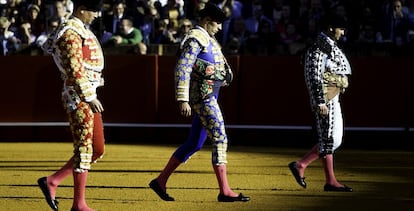Pro-bullfighting lobby throws economic data into the ring
Spain’s “national fiesta” boosts the economy by €1.6 billion, its supporters claim

Opponents and supporters of bullfighting are increasingly resorting to economic data to defend their respective positions. Devotees of the activity, who complain about what they call the “bullying tactics” of the animal rights lobby, have now produced a report claiming the sector contributed some €1.6 billion to the Spanish economy in 2013, the year the study was carried out.
Commissioned by the National Association of Bullfighting Events Organizers (ANOET), the report rebuffs claims by opponents that regional and local governments throughout Spain have subsidized bullfights to the tune of €600 million, putting the nationwide figure for 2013 instead at €25.5 million.
The ANOET report accuses bullfighting’s detractors of taking advantage of the economic crisis to base their opposition on financial arguments
The report also accuses bullfighting’s detractors of taking advantage of the economic crisis to base their opposition on financial arguments. “They are insinuating that bullfighting is entirely dependent on multi-million euro subsidies to survive,” says Mar Gutiérrez, ANOET’s secretary, who contributed to the report.
Using statistics gathered from regional and local administrations, the ANOET report describes bullfighting as a “cultural activity”, insisting it receives fewer subsidies than other such events, despite generating “so much money for the public purse.”

Their claims are supported by a mass of data, noting that in 2013 bullfighting attracted 24.8 million spectators, generating €43.86 million euros in sales tax for the government.
“It created three times as much sales tax as Spanish cinema (€14.5 million) and more than the theater (€35.42 million euros),” the report argues. It also claims that bullfighting has generated as many as 57,000 directly related jobs, along with 142,000 indirect positions.
“Tackling the animal rights lobby’s misleading campaign”
The ANOET report, known as The Bulls In Spain, aims to: "tackle once and for all the misleading and biased campaign" of the anti-bullfighting lobby. Following the banning of bullfighting in Catalonia, the sector blamed itself for losing the fight against the animal rights lobby and decided to retaliate using the media and demonstrations. "This is a sector that has always kept quiet," says Mar Gutiérrez.
The ANOETA report comes at a time when the number of bullfights are down by almost two-thirds on 2007 – from 953 to 398, according to the Ministry of Culture. Bull runs are, however, on the rise, with 15,848 events in 2014, 2,000 more than the previous year, thanks to the support of Popular Party regional and local administrations across Spain.
It is, they say, an activity that injects €1.6 billion into the Spanish economy in total: €422 million directly; €361 million in transport, hotels and catering; and €820 million in knock-on effects.
Nevertheless, regional and local governments are continuing to reduce subsidies for bullfighting, the report says, noting that bullfights receive €30,000 from the national government via the National Bullfighting Awards, along with €25.47 million from local governments.
Needless to say, these figures have little in common with those wheeled out by the animal rights lobby.
In 2013, a number of Spanish European Parliament deputies, along with Alfred Bosch of the Catalan Republican Left (ERC) party, released a report claiming that bullfighting received as much as €571 million from Spain’s public coffers, along with another €129.6 million from the EU – figures that coincide with those compiled by the animal rights lobby.
The vastly different figures each side has produced have triggered mutual cries of foul play. Bullfighting aficionados claim that its detractors are using “dodgy data” to estimate the size of the subsidies: “The Bosch report claims, without any supporting evidence, that the subsidies make up 33% of the total cost,” says a spokesman for the bullfighting lobby.
Meanwhile, animal rights groups accuse their adversaries of coming up with figures that have nothing to do with the impact of bullfighting on local economies, “throwing into the equation, for example, stays at hotels, as though everyone staying in them had come to see the bulls.”
English version by Heather Galloway.
Tu suscripción se está usando en otro dispositivo
¿Quieres añadir otro usuario a tu suscripción?
Si continúas leyendo en este dispositivo, no se podrá leer en el otro.
FlechaTu suscripción se está usando en otro dispositivo y solo puedes acceder a EL PAÍS desde un dispositivo a la vez.
Si quieres compartir tu cuenta, cambia tu suscripción a la modalidad Premium, así podrás añadir otro usuario. Cada uno accederá con su propia cuenta de email, lo que os permitirá personalizar vuestra experiencia en EL PAÍS.
¿Tienes una suscripción de empresa? Accede aquí para contratar más cuentas.
En el caso de no saber quién está usando tu cuenta, te recomendamos cambiar tu contraseña aquí.
Si decides continuar compartiendo tu cuenta, este mensaje se mostrará en tu dispositivo y en el de la otra persona que está usando tu cuenta de forma indefinida, afectando a tu experiencia de lectura. Puedes consultar aquí los términos y condiciones de la suscripción digital.









































